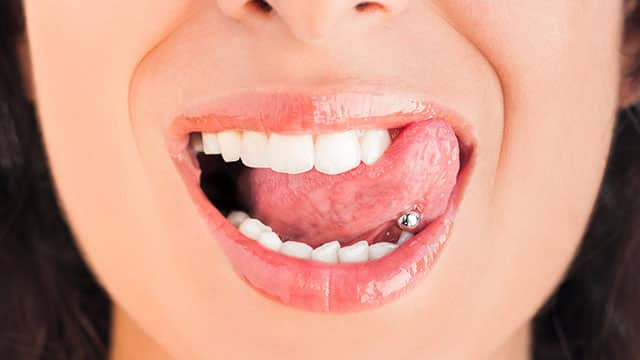What Are Tongue Piercings?
A tongue piercing is a type of body piercing that is directly placed through the tongue. Interestingly, oral piercings have early origins as ancient types of body modification and self-expression. In fact, oral jewelry and tooth ornamentation existed in cultures worldwide, from the ancient Mayan civilization to modern-day Central America. Other decorative oral embellishments still exist today — like tooth gems, dental grills, and gold crowns. Still, tongue piercing is considered the most common type of oral piercing. This type of piercing is classified as “intraoral,” meaning both ends of the jewelry reside in the mouth (whereas “perioral” means an oral piercing that has one end in the mouth and one end penetrating the skin’s surface).
Types of Tongue Piercings
You can choose from several options when it comes to piercings. Many select a stud, which at its most basic form is a rod with a metal sphere at both ends. Other types of tongue piercings, like barbells, rings, and hoops, are made of various metals like stainless steel, gold, and titanium.
Tongue rings refer to a ring inserted through the lingual frenulum, the thin strip of tissue that connects the tongue’s underside to the floor of the mouth.
At this point, you might be wondering: Do tongue piercings ruin your teeth? Are tongue piercings bad for my teeth? How can I prevent tooth damage with a tongue piercing? Keep reading to learn about the risks associated with tongue piercings and how to minimize them.
Risks and Oral Health Issues Associated With Tongue Piercings
A new piercing or tattoo can provide an exhilarating experience. Before you commit, understand the risks associated with any piercings:
- Allergic reactions
- Oral complications, like chipped or cracked teeth, gum damage, or tongue swelling (which can affect chewing, swallowing, and breathing)
- Pain and swelling in the first few days after the procedure
- Skin infections that might cause redness and pain
- Other skin problems like scarring
- Bloodborne diseases such as Hepatitis B, Hepatitis C, and HIV
- Tearing or trauma from jewelry accidentally ripped out.
These risks might seem a little scary, but oral piercing complications are relatively common, which is why you need a comprehensive understanding of the effects on your oral health. Luckily, dentists also commonly treat patients with oral piercings, so talk to your dentist before you decide to move forward.
Cracking, Chipping, and Tooth Decay
When you first get your tongue pierced, you may develop a habit of bumping your jewelry against your teeth when talking or eating or even biting it. This common habit can injure your gums and lead to cracked, scratched, or sensitive teeth. It can also damage fillings. While you might wish for tongue rings or piercings that don’t damage teeth, all tongue piercings put your mouth at risk. If you want to prevent tooth damage with a tongue piercing, talk to your dentist about ways to reduce this habit, as well as potential coverings for the piercing. Beyond the possibility of cracking and chipping, the jewelry can also accumulate plaque as it traps food and debris, which can lead to tooth decay and cavities.
Bacterial Infections
Because of its moist nature, your mouth creates an ideal place for bacteria to grow and live. That puts your mouth at risk of infection, especially when you make an incision and introduce jewelry. An infected piercing could potentially become life-threatening, as your tongue could swell and block your airway.
Nerve damage
Sometimes, your tongue may feel numb after getting pierced, which could be caused by temporary nerve damage. However, in some cases, the damage is permanent — which can affect your sense of taste and mouth movement.
How to Avoid Problems and Take Care of Your Piercing
While a tongue piercing always puts your teeth at risk, you can implement some healthy habits to avoid these oral health issues. Check out these tips on taking care of your piercing.
- Brush twice a day with fluoride toothpaste and a soft-bristle toothbrush.
- Floss daily or use an interdental cleaning device.
- Use an alcohol-free mouth rinse during and after the healing period.
- Keep your piercing site clean, avoid playing with the jewelry, and look for signs of infection — which can manifest as swelling, pain, tenderness, or discharge. Contact your dentist immediately if you have any signs of infection.
- Remove your jewelry if you participate in any contact sports and wear a mouthguard.
- With clean hands, check the tightness of the jewelry, as you could choke on loose or dislodged jewelry.
While having a piercing can fulfill your need for self-expression, the American Dental Association advises against it, as the oral health risks outweigh the benefits. Still, if you have a piercing or want to get one, discuss it with your dentist to help keep your oral health in the best possible shape.
Oral Care Center articles are reviewed by an oral health medical professional. This information is for educational purposes only. This content is not intended to be a substitute for professional medical advice, diagnosis or treatment. Always seek the advice of your dentist, physician or other qualified healthcare provider.
ORAL HEALTH QUIZ
What's behind your smile?
Take our Oral Health assessment to get the most from your oral care routine
ORAL HEALTH QUIZ
What's behind your smile?
Take our Oral Health assessment to get the most from your oral care routine















